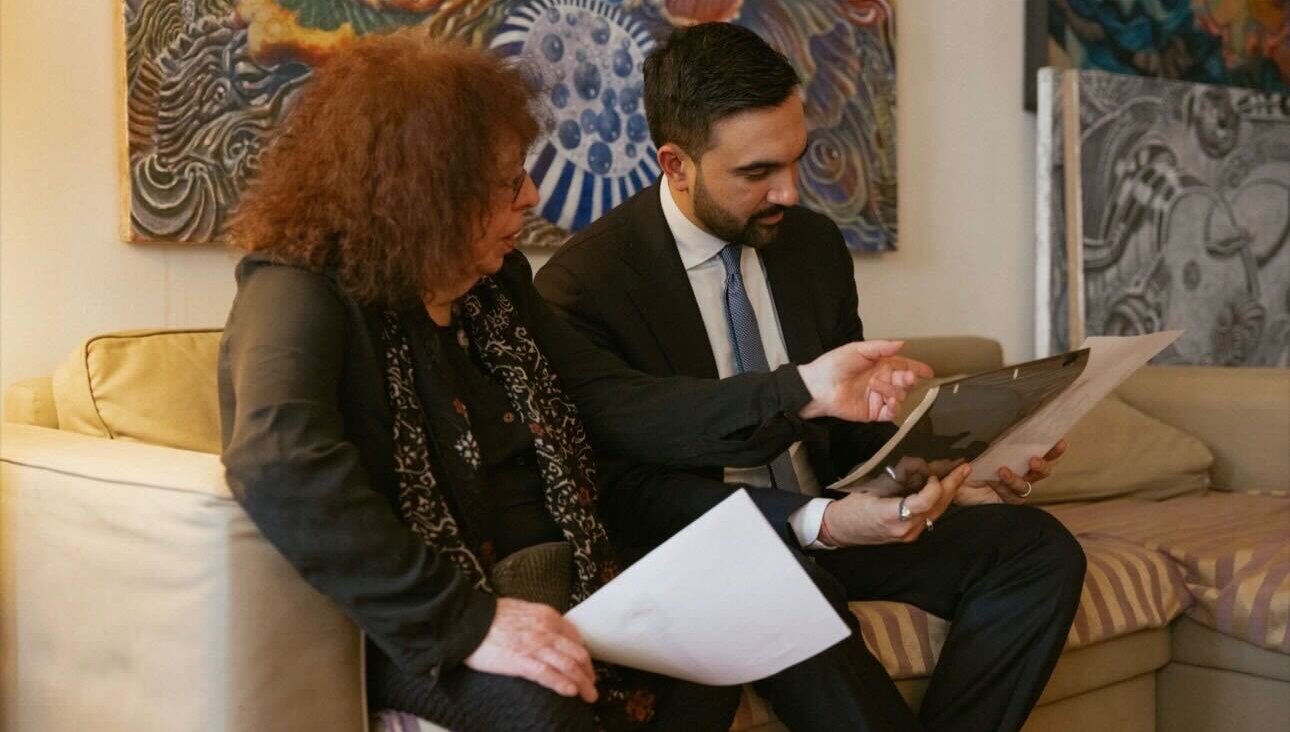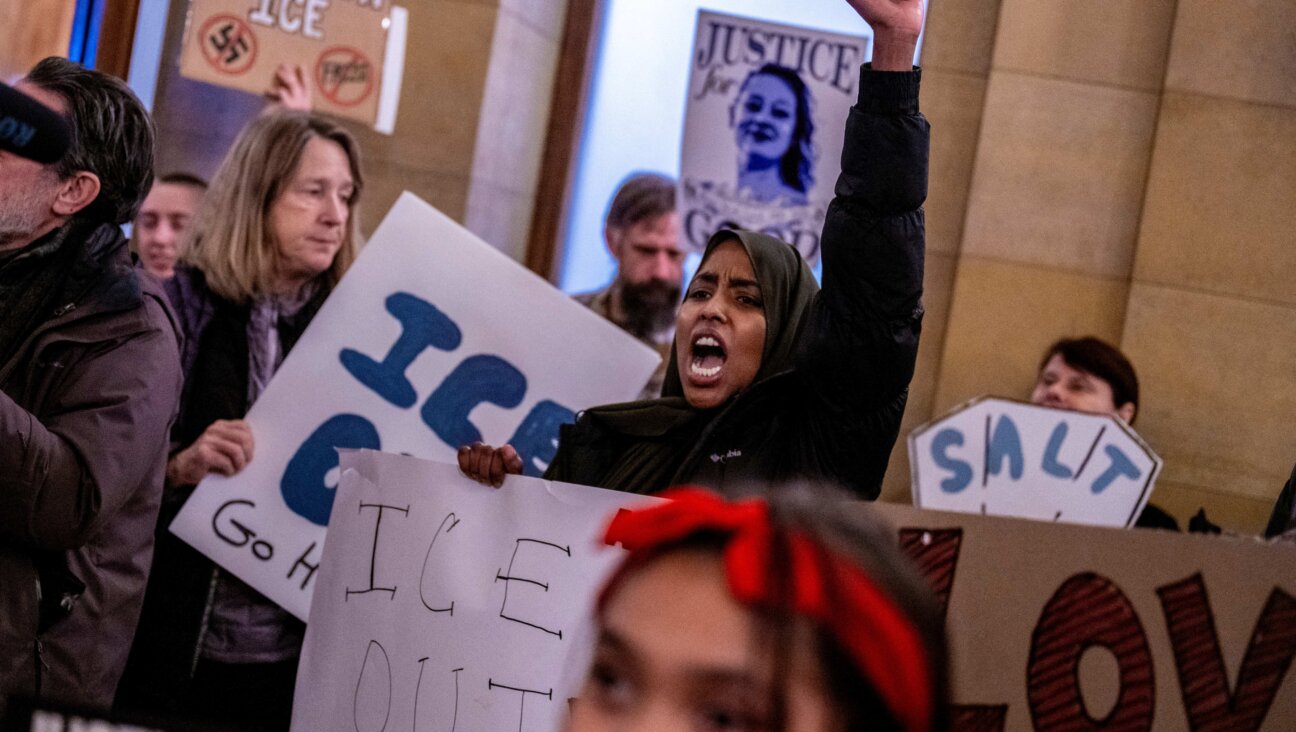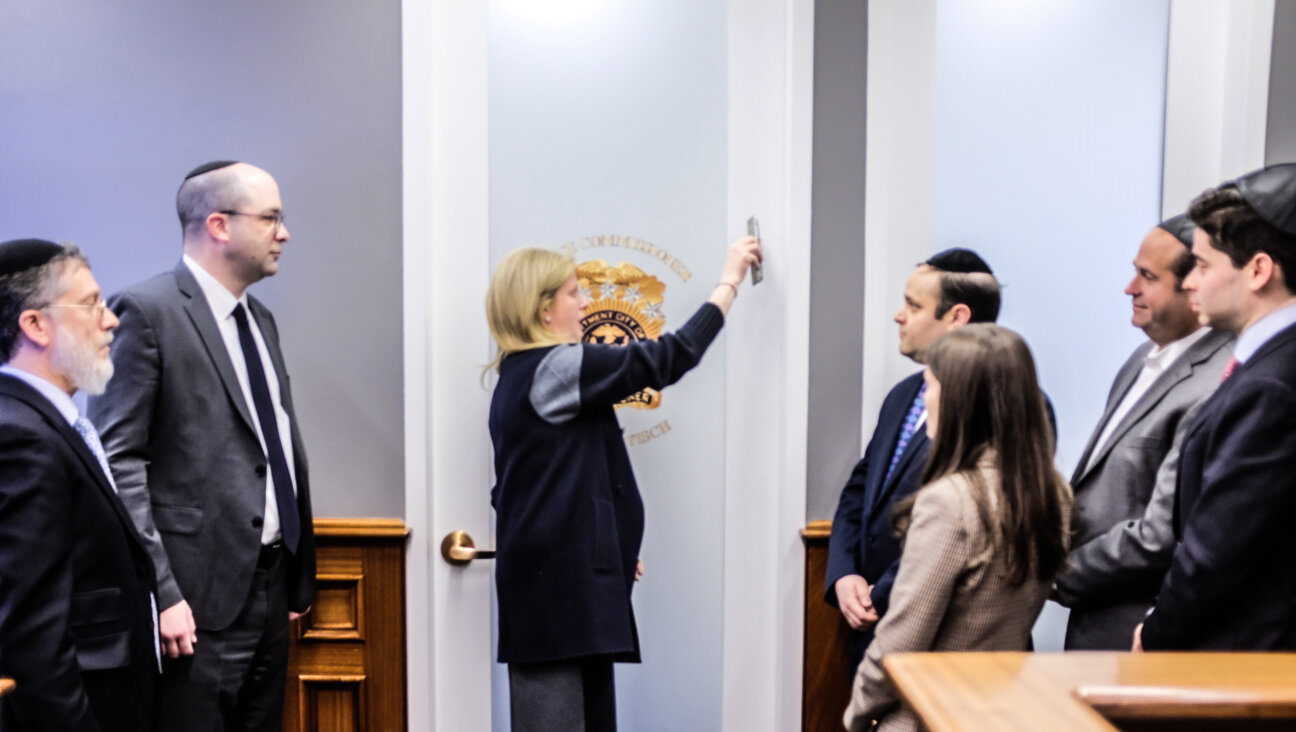South African Jews Struggle With Legacy of Apartheid

Graphic by Angelie Zaslavsky

Bitter Legacy: Amos and Paul Goldreich are still bitter at the way their family was treated by South Africa?s Jewish establishment after their father?s arrest. Image by ilan ossendryver
Since the fall of apartheid, South African Jewry has struggled mightily with two specters from its past. Its central body, the South African Jewish Board of Deputies, worked happily with the apartheid regime, even as that regime violated the civil liberties and human rights of many Jews who were key figures in the anti-apartheid struggle. And Israel’s secret and wide-ranging arms and security ties with apartheid-era South Africa, in violation of a United Nations Security Council ban, enjoyed that same board’s full backing until the day apartheid died.
It is a legacy the board of deputies has labored hard to put behind it by, among other things, developing strong relations with key leaders of the new South Africa. But within South African Jewry, a bitter divide persists between those who cozied up to the apartheid regime — saying they saw this as the only way to protect their own small and vulnerable community — and those who joined the struggle against the regime, often at great personal cost, seeing this path as the only one consistent with their sense of justice and, frequently, of Jewish values.

Exiled in Israel: Anti-apartheid activist Arthur Goldreich had to flee to Israel from his home in South Africa over his support for African National Congress freedom fighters. Image by the GUARDIAN
On August 27, at its 46th national conference, the board of deputies took what it hoped would be an important step in dealing with these ghosts. But rather than salving old wounds, the SABJD’s posthumous granting of a human rights award to anti-apartheid hero Arthur Goldreich has torn at the community’s scabs.
The day before the award was given, the board hosted a preliminary event, at Liliesleaf, the legendary farm outside Johannesburg where, in the early 1960s, Goldreich sheltered fugitive guerrillas who belonged to the military wing of the anti-apartheid African National Congress, including Nelson Mandela.
Goldreich, who died in May, was a lifelong Zionist who fought in Israel’s 1948 independence war in a unit of the Palmach, the young country’s military shock troops, and then returned to South Africa to join the struggle against apartheid. With his Palmach training, Goldreich brought to Umkhonto we Sizwe, the ANC’s young underground military wing, a veteran’s invaluable expertise in warfare. As a white man free to come and go, he traveled to Communist China and elsewhere to obtain designs for homemade military weapons for the group, such as hand grenades and landmines. Meanwhile, in public Goldreich played the role of a prosperous designer for a Johannesburg department store who owned a rural estate maintained by an outwardly subservient black staff that included key ANC leaders. Mandela was a gardener known as “David.”
“Arthur was the convenor of our Logistics Committee of the High Command,” Dennis Goldberg, a senior ANC official and frequent Liliesleaf resident who helped organize the ANC’s guerrilla effort, wrote in an obituary to his friend.
Arrested in a raid on Liliesleaf in 1963, Goldreich and his co-conspirator, lawyer Harold Wolpe, escaped from prison before they could be put on trial with Mandela and other ANC leaders captured in the raid. Goldreich then eluded a nationwide manhunt and eventually returned to Israel, where he became the head of the Industrial and Environmental Design Department at Jerusalem’s Bezalel Academy of Art and Design — and a vigorous campaigner against the strong ties that grew between Israel and apartheid-era South Africa.
The SABJD sought to use its celebration of Goldreich — a centrepiece of its conference — to, among other things, reach out to the many Jewish veterans of the anti-apartheid struggle from whom the South African Jewish establishment has long been estranged. But many of those anti-apartheid veterans assailed the SABJD’s effort as but one more attempt at historical revisionism by a leadership that, at the time, disowned them and strongly distanced itself from the country’s black majority. Many of the activists who were invited boycotted the Liliesleaf gathering, which ended up being sparsely attended.
“The Jewish community abandoned my mother,” Nicholas Wolpe, who was sympathetic to the objectors, bluntly told the twenty-odd people, most associated with the board, who had gathered for the occasion, citing the period after his father Harold was arrested with Goldreich for sabotage. In a frank statement introducing the conversation, Wolpe said, “Jews in the liberation struggle were ostracised. The SAJBD has to look seriously at these issues, which still plague us today.”
Wolpe at least attended the event. So did South African Deputy President Kgalema Motlanthe, himself a veteran of Umkhonto we Sizwe. But the attendance of Yuli Edelstein, Israel’s minister of information and the diaspora, and a staunch defender of the West Bank settlements — which Goldreich bitterly condemned while alive — raised questions for some about just what message the SAJBD was trying to send.
“When I saw that the invitation to Liliesleaf was part of a jamboree, including an Israeli minister, I was even more infuriated,” said one Jewish anti-apartheid veteran who boycotted the event. “The SAJBD continues to play this role of supporting human rights violations in Palestine.”
Such comments laid bare an uncomfortable reality: Israel, particularly since its controversial Gaza military campaign of 2008–2009, continues to exacerbate the pre-existing intra-communal fault lines.
At the conference, Paul and Amos Goldreich, sons of Arthur Goldreich, accepted the posthumous award from the SAJBD on behalf of their father. Like Nicolas Wolpe, Paul Goldreich, who lived at Liliesleaf as a small boy, offered his audience scathing memories of the treatment of his family by members of the Jewish community — but also an olive branch of dialogue.
“Imagine living in a comfortable home and then being evicted overnight with nothing at all,” he told the audience. Just six when his father was arrested, Paul Goldreich and his family lost almost everything they owned when the apartheid government seized virtually everything it found at Liliesleaf. He had to listen to widespread talk about the possibility of his father being hanged. “We were on our own, shunned generally by all,” Goldreich recalled. “We got no support from either the Jewish community or the ANC.”
Nevertheless, Paul Goldreich, today a psycho-analyst based in England, was interested in promoting healing. “Trying to come to terms with the experience of living under apartheid as well as the experience of living in a post-apartheid environment is a very profound and complicated psychological process for everybody,” he told the Forward. “I’ve obviously been aware that for the past 40 years there’s been a problem between Jews involved in the liberation struggle and the more established Jewish community. I accepted the award on my father’s behalf because I thought it was about time this issue came to a head. If the board is prepared to so honor my father, it’s time to meet with them and talk about these things.”
Zev Krengel, the outgoing SAJBD chairman, grappled defensively with the issues raised by Goldreich and Wolpe.
“The Board was the structure to protect the Jewish way of life,” he said. “Its leadership did deals with the devil that they felt protected the Jewish community.” Still, Krengel said of his predecessors who led the SABJD, “I don’t judge them.”
“The board wasn’t set up to fight apartheid,” he said. But he added, “Morally we should have done something….Where we failed as the board is that we didn’t fight for the people who fought apartheid…. I’m saying we should have gone [to meet them], even clandestinely. The leaders still could have helped [them] in their individual capacities. They could have given clandestine parcels and made visits to their houses. Even if we don’t agree with certain individuals’ philosophies, we should still have stood up for them as Jews if their civil liberties were being corroded.
“This is where the leadership failed the people who fought the struggle. We can’t walk away from that,” said Krengel. “I apologise for this as the current chairman.”
It is not hard to understand why the SAJBD would seize upon a figure such as Arthur Goldreich in its attempt to heal the breach that will not fade. With his biography of heroism in the cause of both Zionism and a multiracial South Africa, he seems almost made to order for bridging the chasms confronting South African Jewry’s establishment. Yet both the board and its critics studiously avoided aspects of Goldreich’s biography that discomfited each.
Left largely un-noted at the SAJBD conference was Goldreich’s own unstinting criticism of Israel’s close relationship with apartheid South Africa — a relationship the SAJBD staunchly backed. Then, there was his equally unsparing condemnation of Israel’s policies toward the Palestinians. Goldreich even compared some of these policies to certain aspects of apartheid — though he rejected equating the two.
In 2006, Goldreich denounced Israel’s practice of “bantustanism [which] we see through a policy of occupation and separation,” and “the brutality and inhumanity of what is imposed on the people of the occupied territories of Palestine.”
An advocate of giving up the West Bank and Gaza almost from the moment they were conquered in the 1967 Six Day War, he told the British newspaper the Guardian, “Don’t you find it horrendous that this people and this state, which only came into existence because of the defeat of fascism and Nazism in Europe, and the conflict [in which] 6 million Jews paid with their lives for no other reason than that they were Jews — is it not abhorrent that in this place there are people who can say these things and do these things?”
In 1973, Goldreich went into militry combat one last time, when he served as a reservist in the 1973 Yom Kippur War. But when Israel invaded Lebanon in 1982, Goldreich was a central part of the Peace Now movement which led the campaign against that conflict.
Yet for all this, Goldreich never left Israel or renounced his Zionism— to the unhappiness of some of his South African comrades who decry the SAJBD for its support of Israel.
“There was a strong reaction in the ANC to my father living in Israel,” Paul Goldreich told the Forward at Liliesleaf. “The whole area of the tension with the ANC when my father moved to Israel is very difficult. It’s not something he would talk about.”
Immanuel Suttner, editor of a postapartheid collection of interviews with South African Jews on the left, confirmed on the basis of his interview with Goldreich in 1995 that “there was discomfort because of him being in Israel. People wouldn’t meet with him, and it wasn’t easy when they did meet. But he said he always felt comfortable living in Israel.” Goldreich was reluctant to go public with these sentiments, Suttner said, and ultimately he refused to give Suttner permission to publish his interview.
“My father’s position was quite complicated,” Paul Goldreich told the Forward. “He did have serious criticism of Israel, but nevertheless he was a Zionist to the end of his life in the sense that he believed in the existence of the State of Israel. He lived and worked and had a life in Israel…. He had a view that a different kind of Israel could exist. It’s not a Zionist position in the sense of Zionism at any cost, but he did believe in the validity of the State of Israel.”
Contact Claudia Braude at [email protected]














